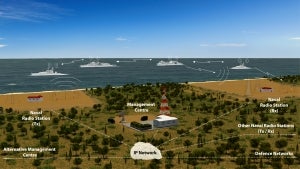
HF communications system Broadcast and Ship-Shore (BRASS) integrates and manages a wide range of distributed communication equipment brands and types.
It additionally provides over the air voice and data services as required for military naval communications in accordance with NATO standards (see figure).
The system software features a high degree of services automation with enhanced centralised management capabilities, thus providing a very efficient, secure and complete support for shore-based naval communications.
The Portuguese configuration of BRASS is based on a distributed architecture, integrating two communication centres and five transmission and reception sites.
The system was designed to satisfy high availability requirements, with redundancy of major components, fault tolerance and degraded modes of operation. The entire system can be managed from each one or from both communication centres.
The supply of the full system was awarded to EID following a public tender issued by the Portuguese Ministry of Defence (MoD) and supported by NATO, which co-funded the project.
However, the message handling and remote supervision software packages were not part of EID’s scope of supply, as the MoD initial plan was to use BICC (BRASS Initial Core Capability) software, to be made available by NATO in due course of the project implementation.
The provision of such software by NATO has been delayed again and again, thus postponing the full operation capability of the system.
As a consequence, the Portuguese MoD challenged EID last year to provide an alternative software solution, the one that has been just deployed, enabling the Portuguese BRASS to become fully operational and offering important improvements when compared to the initial BICC software solution.
From a services standpoint, the supplied software mainly consists of three major subsystems.
Firstly, a messages processing sub-system, which provides the ability to securely exchange military messages with vessels. This sub-system is an EID development, fully complyant with the ACP127
standards that regulate messaging interoperability within NATO nations.
Secondly, a voice management sub-system, enabling secure voice communications among system operators and with vessels, using dedicated voice terminals and integrating Navy private trunk networks also.
Lastly, a remote supervisory and control sub-system, which allows the centralised integrated management of the entire system. This sub-system is responsible for the remote control and monitoring of all communications equipment, namely modems, radio transmitters and receivers, antennas and switches.
It also allows the integrated setup and management of chains of selected equipment in order to establish the communication lines that are required to support the voice and data transmission and reception over the air.
Both the voice management and the remote supervisory and control sub-systems were built on top of EID’s Integrated Communications Control System (ICCS), a state-of-the-art system specifically designed to automate and integrate all the communication-related tasks for military operations environments.
The deployment of this software concludes the successful performance of a 12 million euros contract awarded to EID for the delivery and setting to work of the Portuguese BRASS, covering all the components, from the user workstations to the HF high power radios and antennas, their installation and integration, as well as all relevant logistical supplies.
The new system provides the Portuguese Navy with a full compliant solution for NATO BRASS, with a comprehensive level of automation, redundancy and fault tolerance, totally integrated into the Navy and NATO communication networks.
The system is also ready to be upgraded to BREITA – BRASS Enhancements Increment Technical Architecture. It shall also be noted that EID’s software may be configured and adapted for use in other BRASS systems, either already in operation or in course of installation.

